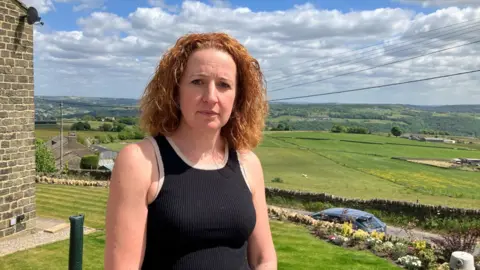'My husband shouldn't have died from a heart attack at 48'
 BBC/Phil Bodmer
BBC/Phil BodmerThe widow of a police officer who died of a heart attack aged 48 said there was "no reason" why he should have succumbed to an unknown cardiac defect.
Craig Higgins, from Sowerby Bridge, in West Yorkshire, was on duty with Greater Manchester Police when he collapsed in 2022.
According to the British Heart Foundation (BHF), there has been a 23% increase in the number of 20-64-year-olds dying of heart and circulatory diseases in Yorkshire since 2019.
Senior cardiac nurse Julie Ward said: "It is significant, the figures are quite shocking. It's a very complex situation, there isn't one factor that's caused it. It's multi-factor."
Dawn Higgins said her husband and the father of her two children appeared fit and healthy and took regular exercise, but had developed a thickening of the heart wall, which made it more difficult for the organ to pump blood around the body.
"He ran a bit, walked his dog every day, didn't have an unhealthy lifestyle. He didn't smoke or drink excessively, was not overweight. Statistically, there was no reason why he should have died."
 Melissa Antons
Melissa AntonsResearch by the BHF also found that in Yorkshire and the Humber there had been a 17% rise in the number of people diagnosed with heart failure in recent years, from 59,320 in 2020 to 69,190.
Another woman who lost her seemingly healthy and active partner is Melissa Antons, whose fiancé, Joe Banks, from Holmfirth, died aged 32 from a cardiac arrest caused by an aortic aneurysm while competing in a half-marathon in Austria last September.
"He was wearing a Garmin watch on the day of the run with his heart rate on it. It all seemed fine, he was living a very healthy life. There were no indications really."
According to the BHF data, there has been an 11% rise in the number of adults diagnosed with diabetes, a major risk factor for cardiovascular disease.
Melissa said she would like to see more routine screening for heart disease.
"Unfortunately you only notice when it's too late, especially with young people. There's a big need for earlier diagnosis."
She thinks screening should begin at the age of 30 to look at how the heart reacts to different tests, such a cycling or running.
Her sentiments are echoed by Dawn.
"Something that's occurred to me recently is perhaps there should be more routine testing. I don't know what age or criteria you'd have to be," she said.
"For example, we've got two sons and their dad has died unexpectedly of an undiagnosed condition. They've not been tested, surely there should be some screening."
The Department for Health has been approached for comment.
Listen to highlights from West Yorkshire on BBC Sounds, catch up with the latest episode of Look North.
